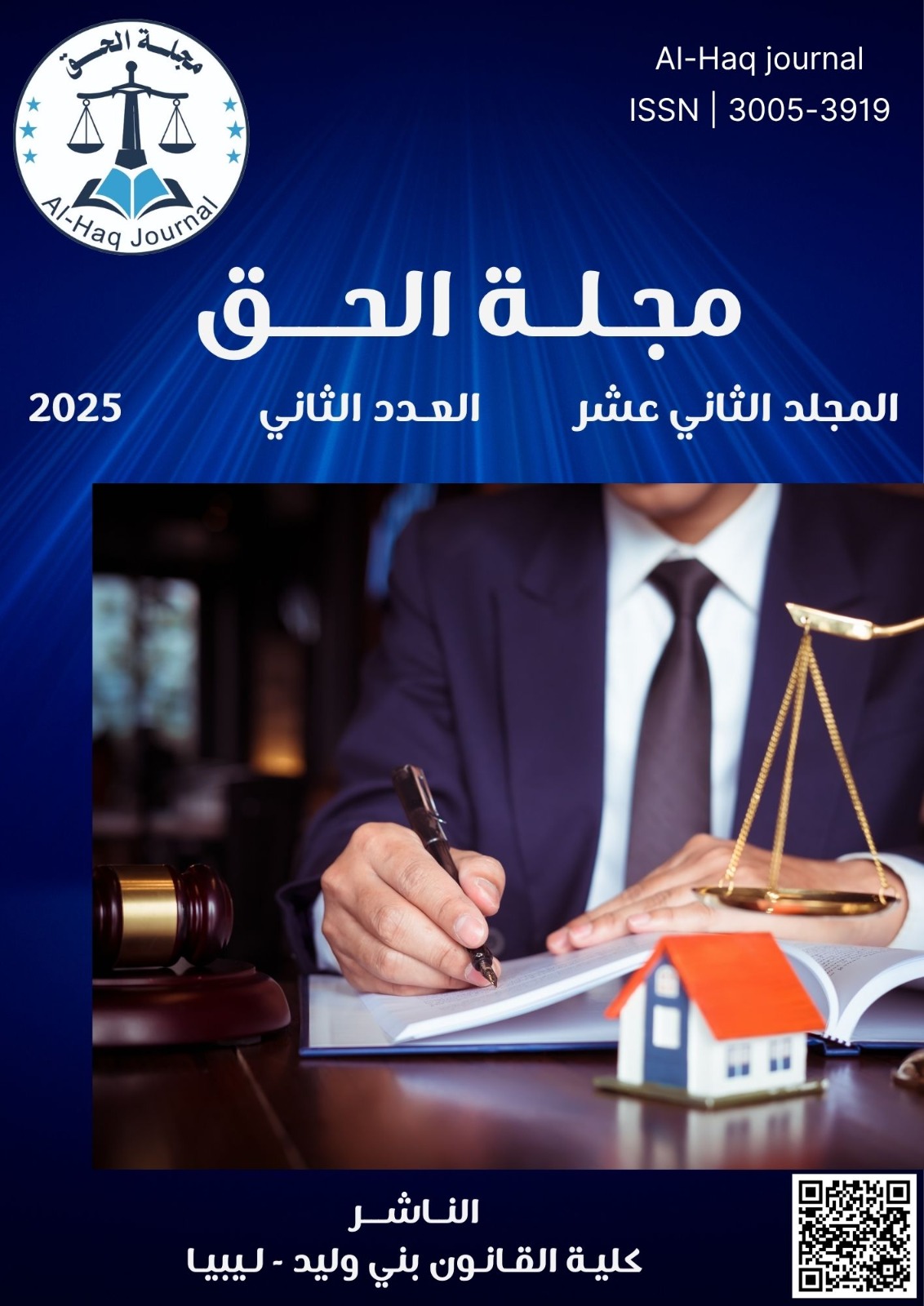The Impact of the Impossibility of Objects on Sharia Rulings – A Comparative Jurisprudential Study
DOI:
https://doi.org/10.58916/alhaq.v12i2.391Abstract
The divine ruling in Islamic law is either based on a cause, dependent on its existence or nonexistence, or purely ritual, without a known cause to follow it, according to the classification of scholars. Since the ruling is related to the cause in reasoned rulings, evidence from the Qur’an, Sunnah, consensus, and reason indicates that the transformation of the impure substance from its true nature and description to another nature with a different description is considered, and the effect of its transformation is taken into account on the legal ruling, based on the fact that the change and transformation of the substance has an effect on the legal ruling. This is what most Malikis consider in a rule they call “transformation,” or other established names for it. Jurists have based many examples on this rule that address the daily life of Muslims, such as the transformation of sewage water, the transformation of cheese formed by the rennet of an animal whose meat is permissible to eat, and other applications that are of great importance. However, the difference in the meaning of this rule and the consideration of its effect was a matter of consideration in the school, and this is what led them to formulate some of its names in the form of a question.
Downloads
References
القرآن الكريم برواية الإمام حفص عن عاصم.
إيضاح المسالك إلى قواعد الإمام أبي عبد الله مالك، أحمد بن يحيى الونشريسي (المتوفى: 914 هـ)، دراسة وتحقيق: الصادق بن عبد الرحمن الغرياني، دار ابن حزم للطباعة والنشر، بيروت – لبنان، الطبعة: الأولى، 1427 هـ - 2006م، عدد الأجزاء: 1.
التاج والإكليل بشرح مختصر خليل، أبو عبد الله المواق المالكي، دار الكتب العلمية الطبعة: الأولى، 1416هـ-1994م عدد الأجزاء: 8.
الذخيرة، أبو العباس شهاب الدين أحمد بن إدريس بن عبد الرحمن المالكي الشهير بالقرافي (المتوفى: 684هـ)، المحقق:جزء 1، 8، 13: محمد حجي/جزء 2، 6: سعيد أعراب/جزء 3 - 5، 7، 9 - 12: محمد بو خبزة، دار الغرب الإسلامي- بيروت، الطبعة: الأولى، 1994 م، عدد الأجزاء: 14 (13 ومجلد للفهارس)
سنن الترمذي، محمد بن عيسى بن سَوْرة بن موسى بن الضحاك، الترمذي، أبو عيسى (المتوفى: 279هـ)، تحقيق وتعليق: أحمد محمد شاكر (جـ 1، 2) محمد فؤاد عبد الباقي (جـ 3) وإبراهيم عطوة عوض المدرس في الأزهر الشريف (جـ 4، 5)، الناشر: شركة مكتبة ومطبعة مصطفى البابي الحلبي – مصر . الطبعة: الثانية، 1395 هـ - 1975 م، عدد الأجزاء: 5 أجزاء.
شرح ديوان المتنبي، أبو البقاء عبد الله بن الحسين بن عبد الله العكبري البغدادي محب الدين (المتوفى: 616هـ، المحقق: مصطفى السقا/إبراهيم الأبياري/عبد الحفيظ شلبي، دار المعرفة – بيروت، عدد الأجزاء: 4×2.
الجامع المسند الصحيح المختصر من أمور رسول الله صلى الله عليه وسلم وسننه وأيامه، صحيح البخاري، محمد بن إسماعيل أبو عبد الله البخاري الجعفي، المحقق: محمد زهير بن ناصر الناصر، الناشر: دار طوق النجاة (مصورة عن السلطانية بإضافة ترقيم ترقيم محمد فؤاد عبد الباقي)، الطبعة: الأولى، 1422هـ، عدد الأجزاء: 9، مع الكتاب: شرح وتعليق د. مصطفى ديب البغا أستاذ الحديث وعلومه في كلية الشريعة - جامعة دمشق، وهو كالتالي: رقم الحديث (والجزء والصفحة) في ط البغا، يليه تعليقه، ثم أطرافه.
القواعد الفقهية وتطبيقاتها في المذاهب الأربعة، محمد مصطفى الزحيلي، دار الفكر- دمشق الطبعة: الأولى، 1427 هـ - 2006 م، عدد الأجزاء: 2.
القواعد والضوابط الفقهية المتضمنة للتيسير، عبد الرحمن بن صالح العبد اللطيف، عمادة البحث العلمي بالجامعة الإسلامية، المدينة المنورة، المملكة العربية السعودية، الطبعة: الأولى، 1423هـ/2003م ، عدد الأجزاء: 2.
لسان العرب، محمد بن مكرم بن على، أبو الفضل، جمال الدين بن منظور الأنصاري الرويفعى الإفريقى (المتوفى: 711هـ)، دار صادر – بيروت، الطبعة: الثالثة - 1414 هـ عدد الأجزاء: 15.
مجمع الأنهر في شرح ملتقى الأبحر، عبد الرحمن بن محمد بن سليمان المدعو بشيخي زاده, يعرف بداماد أفندي (المتوفى: 1078هـ)، الناشر: دار إحياء التراث العربي، الطبعة: بدون طبعة وبدون تاريخ، عدد الأجزاء: 2.
المسند الصحيح المختصر بنقل العدل عن العدل إلى رسول الله صلى الله عليه وسلم، مسلم بن الحجاج أبو الحسن القشيري النيسابوري (المتوفى: 261هـ)، المحقق: محمد فؤاد عبد الباقي، دار إحياء التراث العربي – بيروت، عدد الأجزاء: 5.
المصباح المنير في غريب الشرح الكبير، أحمد بن محمد بن علي الفيومي ثم الحموي، أبو العباس (المتوفى: نحو 770هـ)، المكتبة العلمية – بيروت، عدد الأجزاء: 2 (في مجلد واحد وترقيم مسلسل واحد).
المغني لابن قدامة، أبو محمد موفق الدين عبد الله بن أحمد بن محمد بن قدامة الجماعيلي المقدسي ثم الدمشقي الحنبلي، الشهير بابن قدامة المقدسي (المتوفى: 620هـ)، الناشر: مكتبة القاهرة، الطبعة: بدون طبعة، عدد الأجزاء: 10، تاريخ النشر: 1388هـ - 1968م.
مُوْسُوعَة القَواعِد الفِقْهِيَّة، محمد صدقي بن أحمد بن محمد آل بورنو أبو الحارث الغزي مؤسسة الرسالة، بيروت – لبنان، الطبعة: الأولى، 1424 هـ - 2003 م، عدد الأجزاء: 12.
Downloads
Published
Issue
Section
License

This work is licensed under a Creative Commons Attribution-NonCommercial 4.0 International License.









